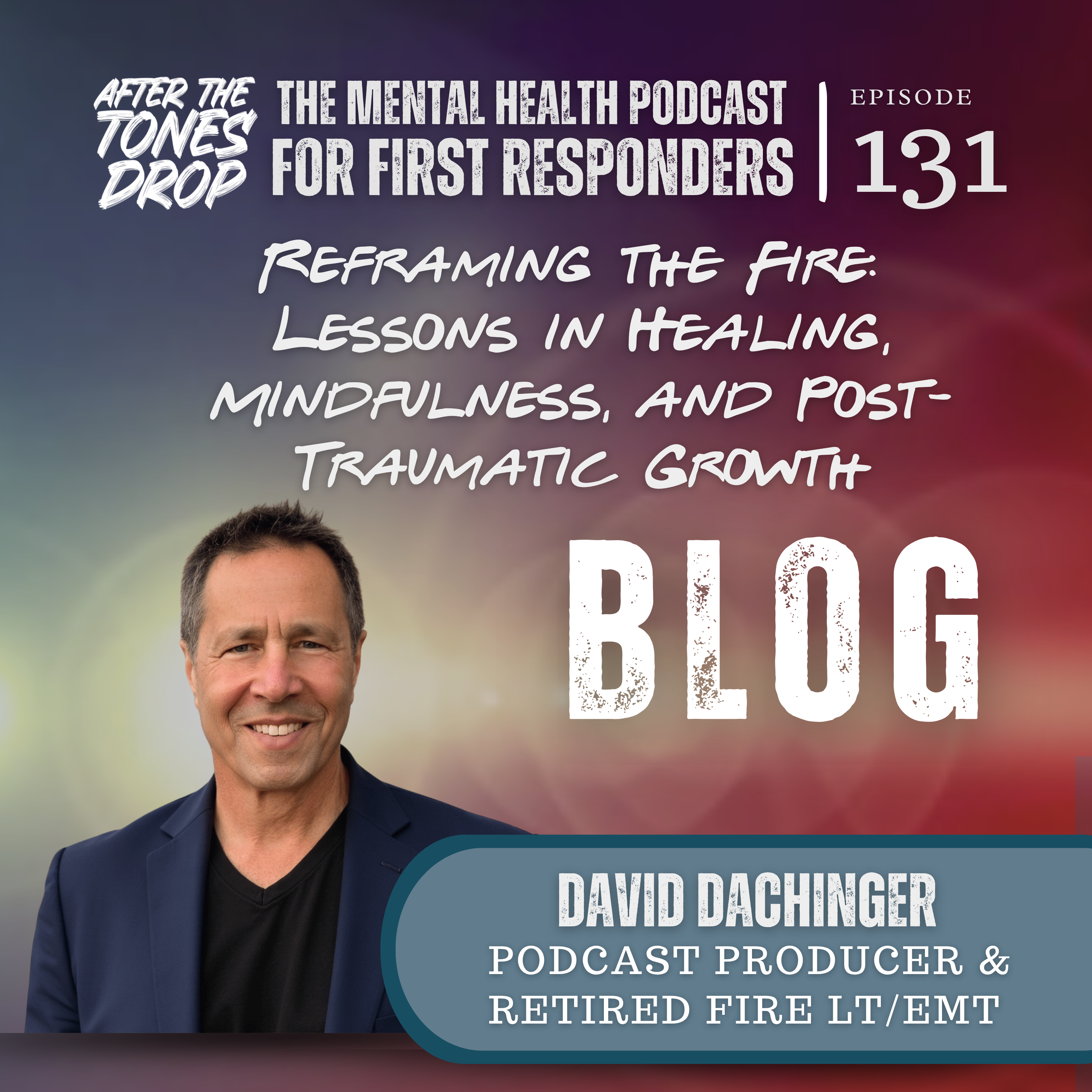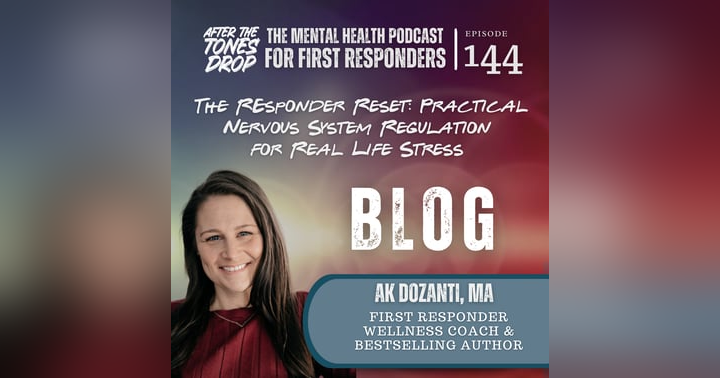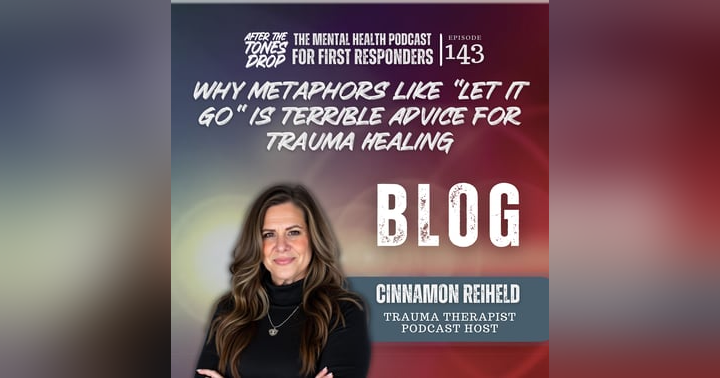Reframing the Fire: Lessons in Healing, Mindfulness, and Post-Traumatic Growth

It’s no secret that first responders carry the weight of what most people can’t imagine. The calls that never leave your mind. The quiet in the middle of chaos. The exhaustion that lingers long after the uniform is hung up for the night.
In Episode 131 of After the Tones Drop, I had the privilege of sitting down with David Dachinger, a retired fire lieutenant, EMT, and co-host of the Responder Resilience podcast. David’s journey is a reminder that healing is not just possible, it’s necessary. And it often begins in the most unexpected places.
A Firefighter’s Second Alarm: A Stage-IV Diagnosis
Before his life in the fire service, David’s world revolved around music. He was a Grammy-nominated recording engineer and producer, working with some of the biggest names in entertainment. But a backyard barbecue next to a firehouse changed everything. What started as curiosity turned into a calling, and soon David was answering tones instead of cues.
Five years into his service, the tones changed again. This time, they came in the form of a stage-IV cancer diagnosis, an alarm that forced him to confront not only his mortality, but his relationship with stress, purpose, and healing.
In our conversation, David shared something that hit deeply:
“You grieve the loss of your life as it was, but you also have this kind of decision to make: do I get busy living or get busy dying? I was not going to get busy dying.”
That moment became the catalyst for everything that followed... his recovery, his advocacy, and his commitment to helping other first responders move from survival to transformation.
Reframing Trauma: The 22Zero Process
One of the most transformative parts of David’s work is his involvement with 22Zero, a nonprofit dedicated to helping veterans and first responders heal from trauma without reliving it.
Through guided imagery and structured memory refiling, the 22Zero process helps the brain disconnect the emotional charge from painful memories. It’s not talk therapy, it’s a non-clinical, peer-led intervention that speaks the language of those who serve.
For so many responders, traditional therapy feels like a dead end. They don’t want to talk about the call. They don’t want to replay the images. They don’t want to feel like a case file.
This approach offers something different. It offers hope.
David put it simply:
“We’re really good at helping other people. We’re really good at suffering, but suffering is an option and nobody told us that.”
When responders realize they don’t have to carry the burden forever, that there are tools that can help them feel peace again, it’s often the first real step toward post-traumatic growth.
Mindfulness, Movement, and the Power of Presence
Throughout his cancer treatment, David leaned on mindfulness and meditation, not as buzzwords, but as survival tools. He began noticing how small, simple practices could shift his nervous system out of survival mode and into healing.
Breathing, walking in nature, connecting with his dog, all became daily rituals of grounding.
“Dogs are the quickest way to get into the present moment,” he shared. “They don’t ask you to be anything other than who you are right now.”
For many first responders, mindfulness feels like something “extra”, something reserved for yoga studios and quiet weekends. But David reframes it as a tactical advantage. A way to regulate your nervous system. A way to stay calm in the storm, both on and off the job.
And as more departments begin integrating wellness programs and embedded mental health clinicians, these practices are finding their way into firehouses, dispatch centers, and police briefings across the country.
Changing the Culture of Wellness in First Response
One of the most powerful parts of our conversation centered on organizational change.
David talked about the difference between departments that “check a box” and those that truly commit to supporting their people.
The truth is, culture change doesn’t start with policies, it starts with permission. Permission to not be okay. Permission to seek help. Permission to heal.
He emphasized the importance of leadership buy-in, peer support, and culturally competent clinicians. Clinicians who understand the first responder mindset, the dark humor, and the unspoken code that comes with the job.
And perhaps most importantly, he shared how departments of any size can start small: by building trust, encouraging conversation, and connecting responders with accessible, low-cost resources like 22Zero and Responder Resilience.
Post-Traumatic Growth: Finding the Gift in the Fire
What struck me most about David’s story is how he continues to find light in the darkest moments.
He’s not denying the pain... he’s redefining its purpose.
“If you’re facing adversity, look for the gift in it,” he said. “Life is happening for you, not to you.”
It’s a message that resonates far beyond the firehouse. Whether you’re a first responder, a family member, or someone walking through your own version of the storm, there’s a universal truth here: healing is not about going back to who you were, it’s about becoming who you were meant to be.
Continuing the Conversation
David’s work continues to ripple through the responder community and beyond. Between his podcasts, coaching programs, and speaking engagements, he’s creating spaces where healing is not just possible—it’s practical.
You can explore his work through:
Responder Resilience Podcast: respondertv.com
Igniting the Shift Within Podcast: podpage.com/igniting
22Zero Peer Coaching Program: 22Zero.org
Book: Helping the Helpers
LinkedIn: David Dachinger
Final Thoughts
As first responders, we’re trained to run toward the fire and to protect, to save, to fix. But healing asks something different of us. It asks us to pause. To feel. To listen. To remember that the same courage it takes to face a burning building is the courage it takes to face ourselves.
David’s story is a reminder that trauma doesn’t have to define the rest of the story... it can become the very thing that ignites the next chapter.



